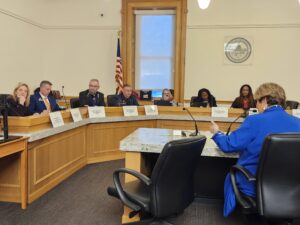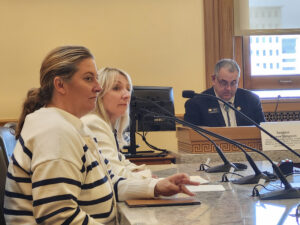The 2025 legislative session was one where business leaders engaged early — rallying against the first bill to get a Senate committee hearing — and often. They spent a lot of time on defense and slightly less on offense, and a few times they faced off against each other.
But for all the time industry leaders spent seeking amendments and asking to postpone bills indefinitely, this session is one that, in the end, could be remembered in a positive, if exhausting, light. Much of the final analysis will hinge on whether Gov. Jared Polis vetoes a bill to overhaul the Labor Peace Act and make it easier to unionize, but Polis indicated at a news conference Thursday that he plans to do just that, according to the Colorado Sun.
In many senses, 2025 may be just a one-year reprieve. Business leaders likely will spend the offseason negotiating artificial-intelligence regulations, will have to fight in 2026 against repeat efforts to cut tax breaks and will face a ballot initiative next year to grant workers unprecedented defense against getting fired.
But, observing the slew of bills that were amended or killed or are going to be vetoed, Colorado Chamber of Commerce President/CEO Loren Furman argued that employers’ messages were heard this year when they said they need a break from fees and regulations. And she hopes that as legislators, particularly those in their first terms, see this, they will spend less time proposing onerous rules and more time negotiating compromises that could help create jobs and address the affordability crisis that both parties decry.
Polis and his veto pen

Gov. Jared Polis speaks to the Colorado Chamber of Commerce board meeting on April 24.
“I do believe that a message is being sent that when you introduce bills like (those with more regulations or fees), you’re not going to get support from both sides of the aisle,” Furman said Thursday, the day after the session ended. “If Senate Bill 5 gets vetoed, I would say this is a good session on behalf of the business community.”
To that point, the veto of the Labor Peace Act overhaul looks imminent at this time, as Polis said Thursday that he dislikes the proposal and plans to veto it after business and labor leaders didn’t reach the consensus that he demanded in his State of the State Address. The bill would have nixed a second 75% vote that is required for unions to bargain to deduct negotiating fees from the paychecks of all workers — an election that labor leaders have called a needless obstacle and businesses say is needed to let workers protect their pay.
Insurers and employer attorneys also will lobby Polis to veto a bill that would exponentially expand the number of providers that injured employees can choose from to get workers’ compensation care, arguing it will slow recovery and add major costs to the system. And Uber and Lyft leaders have begun efforts to seek a veto on a bill that would ramp up safety regulations on rideshare drivers, positing that its provisions are so onerous and generate so much legal liability that they would force Uber to discontinue service in the state.
Governor active in legislative technology debates

Chelsea Congdon, holding a microphone, speaks at an April 14 rally on the Capitol steps urging Gov. Jared Polis to sign a bill regulating social-media platforms.
Polis already has wielded his veto pen to block a bill that would have required social-media sites to police themselves more against illegal activity, and that action led sponsors to kill other bills seeking increased regulation on web-based activity. And vetoes that he threatened during the session played a big role in legislators killing a bill to give special protections to artificial-intelligence whistleblowers and stripping out much of a bill to ramp up state prosecution of price gouging.
But in some cases, business leaders were able to work with bipartisan legislative allies to modify or kill bills without a big assist from the Democratic governor. Sponsors, for example, were forced to nix bills that would have banned retailers from using surveillance data to set pricing (including discounts), would have required employers offer outdoor workers new protections when temperatures dipped below 30 degrees or rose above 80 degrees and would have put new restrictions on hospital sales.
Though the moderate caucus in the Senate shrank slightly in the 2024 election, the more conservative of the two Democrat-controlled chambers still proved a backstop for business-opposed bills. It killed efforts to put more restrictions on childcare centers owned by private-equity firms and to make it easier for plaintiffs’ attorneys to file pricey deceptive-trade-practices lawsuits against employers. And the imminent threat of Senate defeat stopped a Polis-backed bill that would have capped what hospitals could charge to some private insurance plans, leading to passage of an alternative bill that will boost safety-net funding without limiting hospital revenues.
A reprieve of sorts for oil and gas

A customer fuels up at a gas pump in the Denver area.
For the first time in many years, legislators also failed to impose any major new emissions-reduction requirements on industry or to add significant new regulations on the oil-and-gas sector. Legislators, in fact, rolled back decarbonization mandates on the struggling commercial-building sector and declared nuclear fission to be clean energy, opening that sector to new funding and helping the state compete to attract small modular reactors.
Business leaders still had to convince legislators to kill a bill to require large corporations to report even their hard-to-calculate scope-three emissions, as well as a bill that would have attached labels to gas pumps warning of their environmental damage. And while other rumored bills did not surface, including one that would have sought to ban all oil and gas advertising, industry leaders still fretted about the impact of potential bills on a sector struggling under increasing regulations.
“Our industry remains a major economic driver for Colorado, generating valuable tax revenues, creating community-sustaining jobs and providing the energy that we all need and use every day,” Colorado Oil & Gas Association President/CEO Lynn Granger said. “Unfortunately, these proposed bills would not have achieved meaningful benefits but instead would have restricted our ability to conduct business in the state, ultimately negatively impacting Coloradans.”
Legislative wins in regulatory issues

Colorado state Rep. Shannon Bird cheers at the start of a news conference in February rolling out her construction-defects reform bill.
Business groups, led by the Colorado Chamber, did push through several bills that can begin the process of rolling back regulations. Furman put a special emphasis on that goal after a chamber-commissioned study released in December found that Colorado is the sixth-most-regulated state in America and asserted that 45% of its roughly 200,000 rules are excessive or redundant.
SB 306, which cleared both legislative chambers unanimously, will require audits of the fee-funded Unemployment Insurance Division and of the Air Pollution Control Division, which oversees a disproportionate share of new air-quality regulations that legislators are putting into law. SB 254 requires reporting by APCD on what steps it’s taking to reduce permitting times, which now average 459 days. And House Bill 1329 will help to shine light on the prevalence of litigation that is funded by foreign third-party sources.
An eight-year battle to pass construction-defects reform finally succeeded this year, as HB 1272 will create a voluntary program in which builders can get more protection from lawsuits in exchange for guaranteed warranties and the use of third-party inspectors. Polis has said he’ll sign the bill, which is aimed at increasing construction of condominiums that now make up just 3% of new-home inventory because builders and insurers say the likelihood of facing construction-defects suits is too high.
Some legislative fights are coming back

An audience applauds during the Sundance Film Festival.
Even as legislators faced a $1.2 billion budget shortfall, business leaders helped to pass expansions of tax credits for advanced-industry investment and for business conversion to employee ownership, plus a new tax credit to attract the Sundance Film Festival. And their opposition played a major role in gutting a bill that sought to roll back tax breaks for insurers’ regional home offices, software sales and some investments in enterprise zones.
However, sponsors of the tax-break rescission bill, HB 1296, warned that they will come back with a bill in 2026 that not only tries again to remove a tax exemption for software sales but seeks to do away altogether with the regional home office tax credit. And that is just one of several battles that businesses are likely to have to face again next year.
Sponsoring Rep. Elizabeth Velasco said she will be bringing back her effort to regulate work done in “extreme” temperatures, and sponsoring Sen. Cathy Kipp will start meeting with stakeholders next month on the legislative bill to place restrictions on hospital sales. Backers of a failed bill to raise fees on insurance policies to fund the Health Insurance Affordability Enterprise likely will need to try again as they run short of money, and state officials will begin talks soon on a bill to speed up net-zero goals for utilities after deciding not to introduce it this year.
AI talks will dominate the offseason

Colorado Senate Majority Leader Robert Rodriguez speaks on the opening day of the 2025 legislative session.
Technology-sector leaders must work through the offseason to have a bill ready by January if they seek to ease some rules on the artificial-intelligence sector and avert AI developers leaving Colorado for less restrictive states. With a 2024 law that establishes the country’s most comprehensive regulations set to take effect in February, Senate Majority Leader Robert Rodriguez introduced a bill seeking to roll back some burdens, but he killed it when he couldn’t find consensus among business and consumer advocates.
And while it appears that Polis will veto the Labor Peace Act overhaul, the Colorado AFL-CIO vowed Thursday to proceed with a proposition that worries businesses even more — a 2026 ballot initiative that would require employers cite just cause before firing employees. Only Montana has such a law now, and its version has far more loopholes to allow worker dismissals than what the union has proposed for Colorado.
At times, business sectors fought each other. Hospitals and pharmaceutical manufacturers sought separate state guardrails on the federal 340B drug-pricing program, and legislators sided largely with hospitals. Restaurants pushed a bill to ban credit-card payment companies from taking fees on taxes and tips, but they lost that battle against banks and credit unions. Volkswagen dealers backed a bill that would have required Scout Motors to sell their electric trucks through them, but legislators killed that proposal.
Legislative wins offset partially by several business losses

Colorado House Majority Leader Monica Duran explains her wage-theft bill to a skeptical group of Republicans on the House Business Affairs and Labor Committee in January.
A coalition led by the Colorado Restaurant Association sought to expand the tip credit for cities with minimum-wage rates higher than the state’s rate, but they got only a bill that would allow local governments with those higher wages to expand the credit if they wish. And to be sure, business leaders also lost some battles this year that are unlikely to result in gubernatorial vetoes.
Legislators finally passed a bill to study implementation of a single-payer healthcare system. They approved a bill that will increase the ability for workers to sue even minority owners of companies for wage theft and gives new standing to independent contractors. And while business leaders negotiated a slew of changes into a bill that gives Coloradans with disabilities more options to file anti-discrimination claims against businesses, the bill still allows new claims for emotional damages.
It was, for sure, a session full of big legislative ideas that led both to compromise and to head-on collisions that derailed some of those ideas, even if just temporarily.
What lies ahead

Colorado Chamber of Commerce President/CEO Loren Furman and former Colorado Chamber regulatory affairs advisor Christy Woodward react to questions on SB 306 from the Senate Finance Committee in April.
Businesses will return in 2026 hoping to face fewer proposed regulatory increases because of the success they had in beating them back this year, Furman said, but they are aware that they still must explain to legislators why perceived safety boosts can hurt job creation. She hopes the audit bill and APCD transparency bill passed this year will shed light on how overregulation can hurt business growth and will pave the way for more reform in 2026, potentially in the form of increased sunset reviews of regulations passed in recent years.
“We will make sure these programs are operating effectively and efficiently,” she said, using language that she believes could garner support from both sides of the aisle if they just can sit down and talk through its implications.
But if the 2025 legislative session proved anything, it seemed to be that talk about big ideas — those involving regulations and reform, those involving healthcare and energy, those involving the rights of workers versus the rights of employers — is just beginning. And in that sense, evaluations of what this session meant may have to wait not only until Polis’ signing and veto period ends on June 6 but until the 2026 session and November election shows which ideas were fleeting and which will continue to stir legislative battles.
